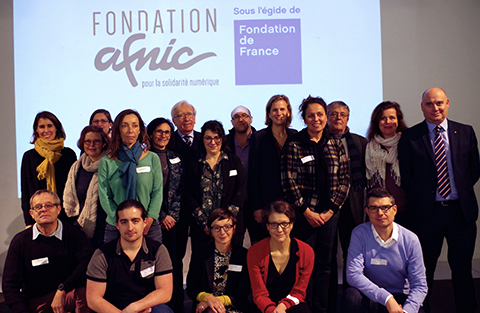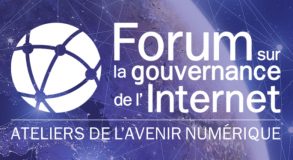
Further to the call for projects launched last February, the Afnic Foundation for Digital Solidarity presented its 35 award winners for 2017 during its annual Open day on December 14, attended by Jean-Michel Hubert, Chair of the Executive Committee, Emmanuel Sartorius, Afnic Chair, and Pierre Bonis, Afnic Chief Executive Officer.
Receiving more than 300 applications (+16% compared with 2016), the second call for projects of the Afnic Foundation for Digital Solidarity was a great success. The call was intended for organizations, associations and cooperatives engaged in activities serving the common good on a non-profit basis and corresponding to at least one of the following objectives:
- Digital technology to strengthen social cohesion
- Training to develop an Inclusive Internet
- Transforming organizations and places
- Digital technology to serve corporate change
- Digital technology central to change in solidarity systems
The key figures of the 2017 call for projects:
- 321 applications were received from 309 eligible organizations and projects
- 88% of the applications were submitted by associations
- 230 grant application files were submitted
- 80 applications were examined, resulting in 35 projects selected
- 12 regions were represented: 11 regions in metropolitan France + New Caledonia
- € 560,000 in funding were awarded for the 2017 projects
The 6 “firm favorite” award winners for 2017
Among the 35 winners of the 2017 year-class, Afnic wanted to highlight 6 emblematic and particularly original projects as firm favorites:
- Cyber tribe: connecting islands by the Jeunesse Informatique association
The purpose of the project is to consolidate and sustain the first cyber-tribe of the Loyalty Islands, off New Caledonia. It provides for the opening of a new cyber-tribe at Mou on the island of Lifou and networking with the Digital Shack (C@ses Numériques) coordination program of the Government of New Caledonia. Its objectives are to increase the skills of the facilitators and to create innovative multimedia workshops for the benefit of the general public.
- Elix/Wikimedia by Signes de Sens http://www.elix-lsf.fr
This project focuses on the integration of French sign language in Wikimedia sites. The goal is to offer free, open-source sign videos of the Elix project and to create a tool to access the signs and definitions of words. The tool will display the sign(s) for a word in a tooltip within Wikipedia articles and wiktionary, the Wiki dictionary.
- e-Mnémo’Stimul by Mnémo’seniors https://www.mnemoseniors.fr
e-Mnémo’Stimul seeks to extend the memory workshops for senior citizens developed up to now within the Tours conurbation to the entire department of Indre-et-Loire, based on a concept of remote facilitation, while maintaining the values of social links, exchange and sharing of the associative project.
- Les Champs des Possibles (Fields of Possibility) by Terre de Liens Languedoc-Roussillon http://www.terredeliens.org
This initiative aims to facilitate access to land for farmers in search of more acreage, by making property opportunities visible as close as possible to the regions in which the farmers live. Participatory citizen mapping of agricultural land will serve as a support for discussion at the regional level in order to preserve agricultural land in the regions.
- Murs de Fresnes (The Walls of Fresnes Prison) by Mabel Octobre http://www.mabeloctobre.net
This project proposes a game-based approach to history to breathe new life into the memory of the members of the resistance who were held in Fresnes Prison during the Occupation, using an innovative Trans Media system (immersive experience, interactive show, generative notebook). In addition to immersion on the web and as an interactive show, it can be used in workshops, publications, research and debates.
- Territoire Numérique Apprenant (Digital Learner Region) by SAPIE http://tll.sapie.eu
Territoire Numérique Apprenant is adapting public spaces and building a digital learning path within Limousin third-party locations with and for high-school pupils and students taking the Advanced Technician’s Certificate (BTS). The project creates a venue for cooperation between young people and professionals on concrete projects and is designed to enable access to study courses and knowledge essential in tomorrow’s digital society.
“We are very proud of the success of the Afnic Foundation for Digital Solidarity. Over and above the increase in the number of applications this year, we wish to highlight the quality and originality of the projects that prove that digital solidarity initiatives provide concrete answers to highly diverse societal issues“, underlined Pierre Bonis, Afnic CEO.
- For further information, please see: http://www.fondation-afnic.fr/
About the Afnic Foundation for Digital Solidarity
Created in 2015 to have digital technology serve solidarity, integration and inclusion in France, the purpose of the Afnic Foundation for Digital Solidarity is to support all those who want to use the Internet and its services for a more inclusive, supportive and egalitarian society. With a budget of nearly two million euros for the first two fiscal years, the Foundation organizes its support in the form of finance and/or by providing expertise (either by attending a meeting attended by project backers and experts, or through individual support). And to make itself known, the Afnic Foundation for Digital Solidarity proceeds by calls for projects and relies on associations and institutions to relay them in the field. This allows the development of new, innovative and exemplary projects. By funding the Foundation with the profits from the management of the .fr TLD, Afnic provides the local Internet community with revenue generated through the use of the .fr TLD, which is a common good for the entire community. In so doing, all of Afnic’s efforts to make the .fr TLD more attractive, more competitive and simpler have a direct impact on the amount of resources available to the Afnic foundation.
For further information, please see: http://www.fondation-afnic.fr/
About Afnic
Afnic is the acronym for Association Française pour le Nommage Internet en Coopération, the French Network Information Centre. The registry has been appointed by the French government to manage domain names under the .fr Top Level Domain. Afnic also manages the .re (Reunion Island), .pm (Saint-Pierre and Miquelon), .tf (French Southern and Antarctic Territories), .wf (Wallis and Futuna) and .yt (Mayotte) French Overseas TLDs.
In addition to managing French TLDs, Afnic’s role is part of a wider public interest mission, which is to contribute on a daily basis, thanks to the efforts of its teams and its members, to a secure and stable internet, open to innovation and in which the French internet community plays a leading role. As part of that mission, Afnic, a non-profit organization, has committed to devoting 11% of its Revenues from managing .fr Top Level Domain to actions of general interest, in particular by transferring €1.3 million each year to the Afnic Foundation for Digital Solidarity.
Afnic is also the back-end registry for the companies as well as local and regional authorities that have chosen to have their own TLD, such as .paris, .bzh, .alsace, .corsica, .mma, .ovh, .leclerc and .sncf.
Established in 1997 and based in Saint-Quentin-en-Yvelines, Afnic currently has nearly 90 employees.




